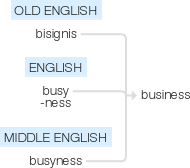Business
Old English bisignis ‘anxiety’ (see busy, -ness); the sense ‘state of being busy’ was used from Middle English down to the 18th century, but is now differentiated as busyness . The use ‘appointed task’ dates from late Middle English, and from it all the other current senses have developed.
wiktionary
From Middle English busines, busynes, businesse, bisynes, from Old English bisiġnes(“business, busyness”), equivalent to busy + -ness. Doublet of busyness.
etymonline
business (n.)
Old English bisignes (Northumbrian) "care, anxiety, occupation," from bisig "careful, anxious, busy, occupied, diligent" (see busy (adj.)) + -ness. The original sense is obsolete, as is the Middle English sense of "state of being much occupied or engaged" (mid-14c.), the latter replaced by busyness. Johnson's dictionary also has busiless "At leisure; without business; unemployed." Modern two-syllable pronunciation is 17c.
Sense of "a person's work, occupation, that which one does for a livelihood" is first recorded late 14c. (in late Old English bisig (adj.) appears as a noun with the sense "occupation, state of employment"). Sense of "that which is undertaken as a duty" is from late 14c. Meaning "what one is about at the moment" is from 1590s. Sense of "trade, commercial engagements, mercantile pursuits collectively" is first attested 1727, on the notion of "matters which occupy one's time and attention." In 17c. business also could mean "sexual intercourse."
Business card first attested 1840; business letter from 1766. Business end "the practical or effective part" (of something) is American English, by 1874. Phrase business as usual attested from 1865. To mean business "be intent on serious action" is from 1856. To mind (one's) own business "attend to one's affairs and not meddle with those of others" is from 1620s.
